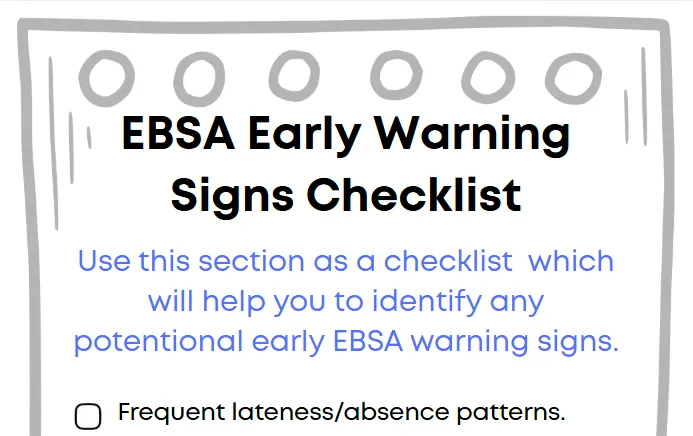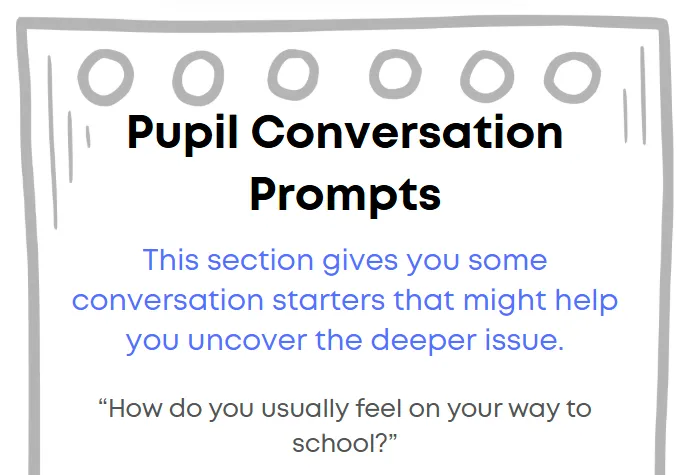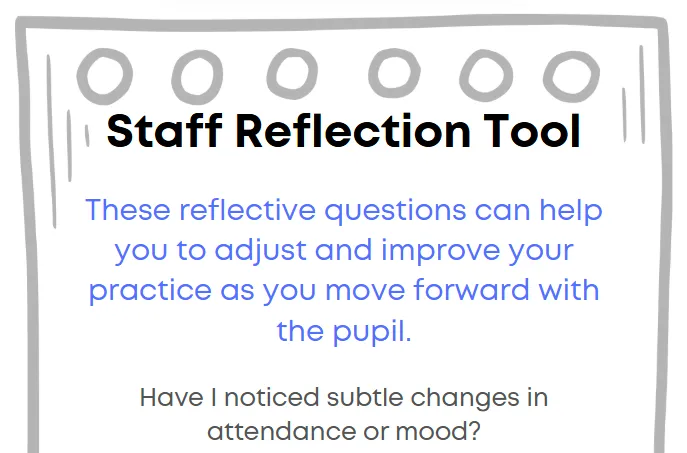Understanding Emotionally Based School Avoidance (EBSA)
Emotionally Based School Avoidance (EBSA) is more than just a child's reluctance to attend school; it is a complex phenomenon that involves a range of factors. It indicates more profound emotional distress that can significantly impact a pupil's well-being, learning, and long-term prospects if not recognised early. School staff play a crucial role in this, being in a unique position to detect subtle signs and respond swiftly, thereby demonstrating their value and integral role in the student's well-being.
What is EBSA, and How Does it differ from Truancy?
EBSA happens when a pupil's anxiety, fear, or emotional challenges stop them from attending school consistently. Unlike truancy, EBSA is caused by distress rather than disobedience. Early intervention is essential, as extended absence makes reintegration more difficult and can deepen emotional issues.
Why Recognising EBSA Early is Crucial for Schools
Changes in Attendance Patterns
- Frequent lateness or requests to leave early
- Increased absences on certain days (e.g. PE days, tests, social events)
- Reluctance to return after weekends or holidays

Physical Complaints
- Regular headaches, stomach aches, or nausea, often with no apparent medical cause
- Frequent visits to the medical room
- Illnesses appearing just before school or at transition points in the day
Emotional and Behavioural Indicators
- Tearfulness, clinginess, or panic at drop-off
- Irritability or anger when asked about school
- Withdrawal from peers, avoiding social interaction
- Heightened anxiety about specific lessons, teachers, or environments
Academic and Classroom Changes
- Sudden drop in effort or achievement
- Difficulty concentrating, zoning out, or appearing tired
- Perfectionism or fear of making mistakes
Home–School Clues (reported by parents/carers)
- Morning battles, refusal to get dressed, or hiding school items
- Increased worry the night before school
- Intense relief or improved mood when staying at home
Why Early Recognition Matters
Identifying EBSA early allows staff to:
- Prevent entrenched absence patterns
- Reduce family stress and conflict at home
- Support the child's emotional well-being
- Collaborate with parents to develop supportive strategies
Practical Strategies for School Staff to Support Pupils with EBSA
Notice and Record: Keep logs of attendance changes, emotional signs, and parental reports. Patterns often reveal the underlying issues.
Open Conversations: Gently check in with the pupil: "I've noticed you're finding mornings tricky—what's been hardest for you?" Simple, non-judgmental language helps them feel safe.

Strengthen Relationships: Assign a trusted adult or key worker for regular check-ins to maintain open communication. Relational safety is a protective factor.
Adapt the Environment
- Early/quiet entry into class
- Reduced homework while anxiety is high
- Access to a calm space during overwhelm
Collaborate with Families: Approach parents as partners, avoiding blame and judgment. Share observations and invite their insights.
Seek Support Early: Use in-school pastoral systems and, if necessary, external agencies (e.g., Educational Psychology, CAMHS, Attendance/Welfare officers).
Key Takeaway: EBSA is About 'Can't', Not 'Won't'
EBSA is not about won't, it's about can't. Early recognition and compassionate responses from school staff make a significant difference. By noticing the early signs and intervening supportively, we can help pupils feel safe, understood, and gradually re-engage with school. This key takeaway should reassure the staff of their ability to make a positive difference in the lives of their students.

Free Resource: EBSA Early Warning Signs Toolkit
To support this article, we've created a practical resource pack for school staff and professionals. This EBSA Early Warning Signs Toolkit includes:
- A checklist of early indicators to watch for in pupils
- Pupil conversation prompts to encourage open dialogue
- A parent partnership template for constructive home–school communication
- A support planning framework with adaptable strategies
- A staff reflection tool to refine your practice
You can download the complete toolkit below. It's free to use and licensed under CC BY-NC 4.0, allowing you to share and adapt it for non-commercial purposes, provided credit is given to Unlocking Children.
📥 Download the EBSA Early Warning Signs Toolkit (PDF)
If you use this resource, please consider donating


